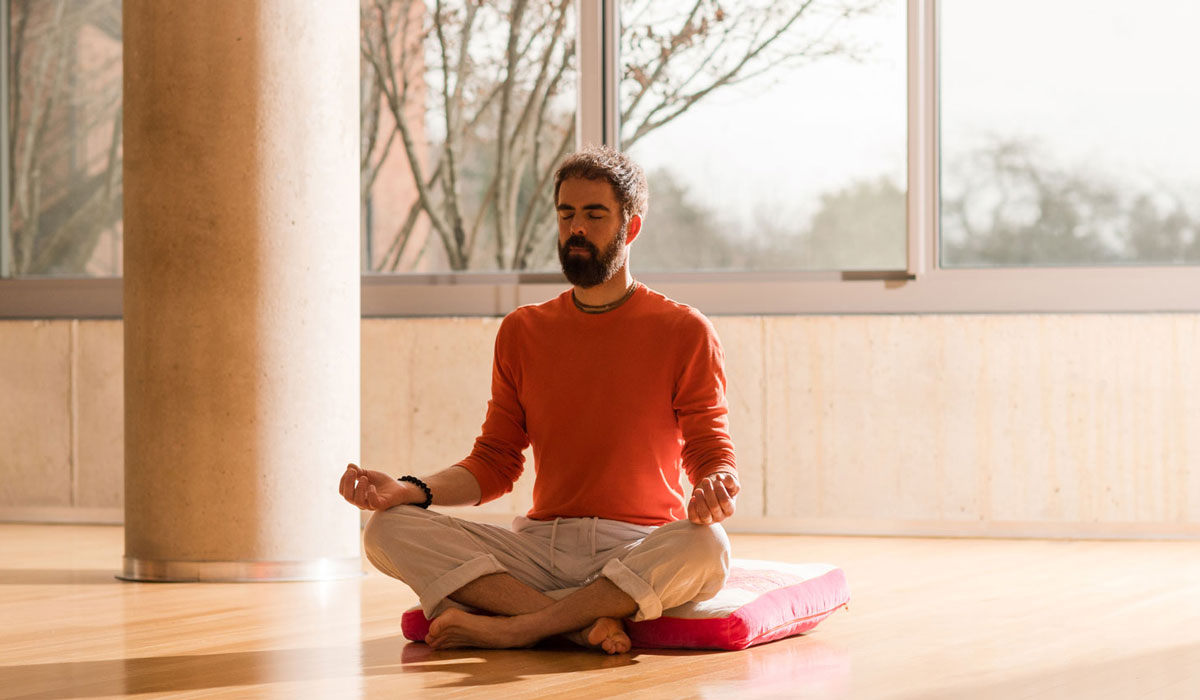What You’ll Get Out of a Silent Retreat, and How to Take It Home

Silence is really good for us. Spending a portion of our downtime in silence helps regulate our hormones, reduce our blood pressure, boost our immune systems, and enhance our creativity and self-awareness. The result is greater calm, clarity, and centeredness.
But silence is also increasingly difficult to find—which is where silent retreats come in. Kripalu offers the opportunity to engage with silence each January during our annual Contemplative Week. For five days, everyone at Kripalu—guests, presenters, and staff—observe social silence. All meals are eaten in silence, and teachers lead seated, walking, and nature-based meditations.
“What I find so impactful in doing a week of silence is the power of practicing in community,” says Erin Casperson, Dean of the Kripalu School of Ayurveda. “The experience leads to deeper insights, and being in silent meditation with others makes the practice a whole lot easier.”
Noble Silence
During Contemplative week at Kripalu, guests are highly encouraged to turn off cell phones and computers, and sometimes not even journal or read books. “It becomes a curious approach to discovering what emerges from silence,” says Jess Frey, a transformational coach, artist, and Kripalu School of Yoga faculty member.
Jess says Buddhists refer to silent retreats like Contemplative Week as “Noble Silence.” “It’s a practice utilized by many spiritual education centers and monasteries,” she explains, “and can help create a communal environment conducive to the development of concentration, calm, insight, wisdom, presence, compassion, and care.”
When we put away our phones and laptops, stop listening to music and podcasts, refrain from conversation, and commit to mindful silence—for a handful of hours, a few days, a week, or longer—we return to daily life not just renewed, but more awake to who we are and what we most need.
Silence and Sattva
From an Ayurvedic perspective, Erin notes, participating in a silent retreat can help to increase the state of mind and being called sattva. “Sattva is our natural state,” she explains. “We know we’re in a sattvic space when we’re centered, creative, kind, compassionate, nonreactive, clear, and able to give without expectation.”
Rajas and tamas, on the other hand, are disturbed states of mind (restless and dull, respectively) that are, according to Ayurveda, the result of an overuse of the senses—a common issue in our noisy, tech-saturated world.
“For me, a silent retreat regulates my nervous system in a way that I’m able to be more present with the flurry of life,” Erin says. “My patience increases; my ability to manage a hectic schedule becomes more relaxed and efficient, and my communication becomes more effective.”
Five Ways to Carve Out Quiet Time
To dip your toe into the well of silence, or to ensure that the benefits gained during a silent retreat don’t evaporate as soon as you get home, try carving out daily silent time.
“Just like you wouldn’t eat healthy one week a year and have fast food the rest of the year,” Erin says, “you’ll want to start a regular practice of silence to support the positive effects of a silent retreat.”
- Start the day with meditation (as few as four minutes or as long as you have time for) and refrain from listening to podcasts, news, or music for an hour or two after you wake up.
- Take silent breaks at work or right after work—a walk outside without technology, or a drive home without the radio on.
- Bring quiet and focus into your conversations; be present without checking your phone or email or looking over your companion’s shoulder.
- When you head out for dinner or to a meeting, think about whether you can leave your phone behind, rather than reaching for it automatically.
- Make your own silent retreat: For a day or a weekend, commit to not answering the phone, turning on the television, listening to music, or talking. Spend the time meditating, doing yoga, hiking, or another quiet practice that feeds your soul.
Ultimately, Erin says, when we give our ears a break from constant noise, we give our minds a break. “Ayurveda teaches us that we are a braid of senses, mind, body, and spirit, and that all of our consumption and experiences affect one another. If we give the senses time off, the body can relax, the mind can settle, and we can more easily surrender into the moment.”

